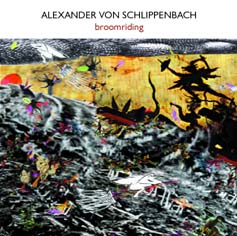
Three years ago, saxophonist Evan Parker started his own label, psi. Since then he has issued recordings on a steady basis, some under his own name and others by his longtime time friends and musical associates. Of these, veteran pianist Alexander von Schlippenbach certainly shares one of the longest playing histories with the reedman, going as far back to the early editions of the Globe Unity Orchestra of the late ’60s and his own bassless trio with drummer Paul Lovens.
In this recording, where Lovens also happens to be on board, the pianist is joined by yet another wily workhorse of the European improv scene, Tristan Honsinger, and bass clarinetist Rudi Mahall, a younger member of that coterie whose name has been appearing consistently in the last couple of years.
Recorded for the Berlin radio network RIAS in September 2002, this nearly 68-minute excursion is divided into 11 tracks : seven of these are credited to the pianist, all of which bear the title of this disc (and in variants numbered 1 to 7), with two tracks by Honsinger and Eric Dolphy respectively. (Of the latter, there is a much more angular sounding “Straight Up and Down” than its title implies, while “Something Sweet, SomethingTender” closes the disc on a wistful note, as per the tune’s balladic mood).
Turning to the musicians themselves, anyone who knows the work of the pianist is aware of his indebtedness to the American jazz tradition. von Schlippenbach, repays the debt beyond the Dolphy covers, chiefly in some definitely Monkish-like runs and a few notes of “ Light Blue” at the beginning of track seven. Cecil Taylor’s pianisms are not far away either, and “A. v. S. ” shows his fleet fingerdness on many occasions without ever being showy about it. Equal to him are his partners, all of whom engage in a high speed chase on the fourth variant of the title piece, for instance, where Lovens drives the band in true Han Bennink fashion.
Like other endeavors in this idiom, and especially creations by a new band, things don’t gel instantly. The quartet searches some without making it sound like a terrible struggle, but it only begins to hit its stride towards the end of the fourth cut. By the fifth, the quartet serves up the first item penned by the cellist ( “poetica”). That Dutch style is clearly in evidence here, and this piece would would fit very well into the book of Tobias Delius’s quartet, of which Honsinger is a member.
If you haven’t heard the bass clarinetist before, he is one of those rare specialists of that larger horn and his rough-and-tumble approach is not unlike Dolphy’s: lots of leaps, short explosive bursts, assorted smears and uncontrolled squeaks popping out here and there. In this context, his technical imperfections are not liabilities but demonstrate a willingness to recklessly go for it, which is the basic tenor of the music here.
Honsinger definitely prefers intense bowing to pizzicato bass walks. He chimes in with some trademark vocal hoots and groans, most notably when the playing hits a furious pace, or one of his typical non-sequiter spoken phrases in instances where the music appears to be treading water. Lovens is unquestionably one of the quintessential Euro improv percussionists (and not just a drummer), one who can clatter around with the best of them, mark time when needed, yet keep other players constantly on their toes with his assorted bag of devious tricks (including his trusted musical saws).
All in all, this is about as direct and spur-of-the-moment playing as one could ever hear, and even if there is some compositional material along the way, they are more like signposts on an otherwise wonderfully rollicking joyride. If you like Formula 2 racing, or auto rallies, here is a good a musical equivalent of that.
Comments and Feedback:
|



